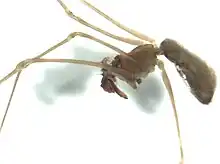| Physoglenidae | |
|---|---|
 | |
| Pahoroides sp. (male) | |
| Scientific classification | |
| Domain: | Eukaryota |
| Kingdom: | Animalia |
| Phylum: | Arthropoda |
| Subphylum: | Chelicerata |
| Class: | Arachnida |
| Order: | Araneae |
| Infraorder: | Araneomorphae |
| Family: | Physoglenidae Petrunkevitch, 1928 |
| Diversity | |
| 13 genera, 73 species | |
Physoglenidae is a family of araneomorph spiders first described by Alexander Petrunkevitch in 1928 as a subfamily of Pholcidae.[1] It was later moved to Synotaxidae[2] until a study in 2016 showed that they formed a distinct clade.[3]
Genera
As of April 2019, the World Spider Catalog accepts the following genera:[4]
- Calcarsynotaxus Wunderlich, 1995 — Australia
- Chileotaxus Platnick, 1990 — Chile
- Mangua Forster, 1990 — New Zealand
- Meringa Forster, 1990 — New Zealand
- Microsynotaxus Wunderlich, 2008 — Australia
- Nomaua Forster, 1990 — New Zealand
- Pahora Forster, 1990 — New Zealand
- Pahoroides Forster, 1990 — New Zealand
- Paratupua Platnick, 1990 — Australia
- Physoglenes Simon, 1904 — Chile
- Runga Forster, 1990 — New Zealand
- Tupua Platnick, 1990 — Australia
- Zeatupua Fitzgerald & Sirvid, 2009 — New Zealand
References
- ↑ Petrunkevitch, A. (1928). "Systema Aranearum". Transactions of the Connecticut Academy of Arts and Sciences. 29.
- ↑ Forster, R. R.; Platnick, N. I.; Coddington, J. (1990). "A proposal and review of the spider family Synotaxidae (Araneae, Araneoidea), with notes on theridiid interrelationships". Bulletin of the American Museum of Natural History. 193.
- ↑ Dimitrov, Dimitar; et al. (2016). "Rounding up the usual suspects: a standard target-gene approach for resolving the interfamilial phylogenetic relationships of ecribellate orb-weaving spiders with a new family-rank classification (Araneae, Araneoidea)" (PDF). Cladistics. 33 (3): 221–250. doi:10.1111/cla.12165. PMID 34715728. S2CID 34962403. Retrieved 2016-10-18.
- ↑ "Family: Physoglenidae Petrunkevitch, 1928". World Spider Catalog. Natural History Museum Bern. Retrieved 2019-04-23.
This article is issued from Wikipedia. The text is licensed under Creative Commons - Attribution - Sharealike. Additional terms may apply for the media files.